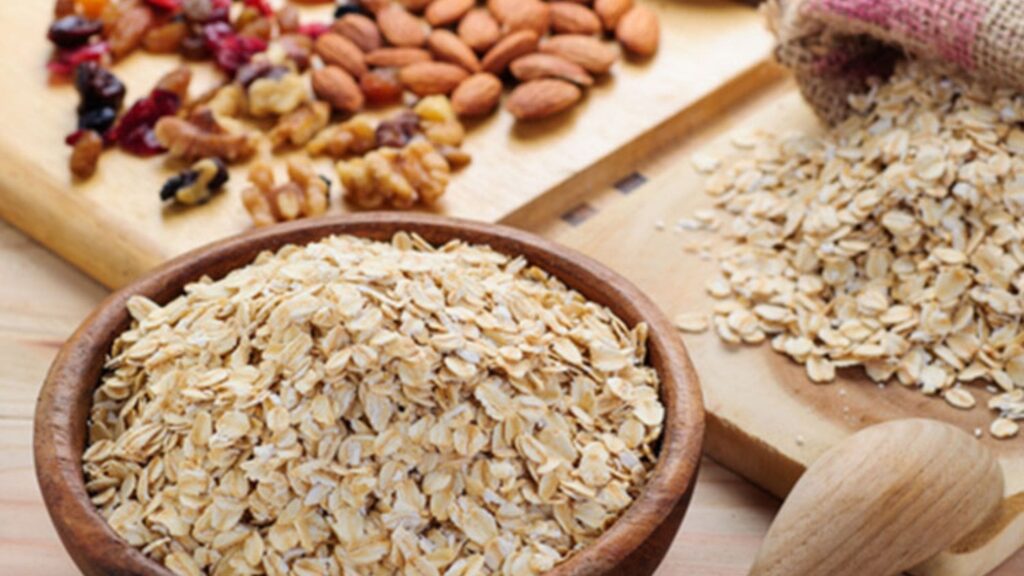Table of Contents
In every nutrition-based diet, Muesli and Oats are omnipresent. Both Muesli and Oats are filled with essential nutrients such as dietary fibre, proteins, vitamins, which can help you stay fit and lose that extra weight. Both these superfoods are often confused with one another. Muesli is a ready-to-eat cereal and a combination of wholesome ingredients like oats, dried fruits, wheat flakes, nuts, and berries. Whereas, Oats are a type of cereal grain made from rolled oat grass seeds.

To understand the significance of the two, it is important to compare and analyse the nutrition quotient, generic construction, and innate benefits of Muesli and Oats. So, let’s have an insight into the specifications and features of Muesli and Oats.
Difference between Muesli and Oats
Based on the definition:
What is Muesli?
Muesli is a ready-to-eat cereal made with a base of whole grains and oats, mixed with a variety of nutritious ingredients such as seeds, nuts, and dried fruits. It is one of the most popular breakfast options available in a wide variety of delicious flavours like chocolate, dry fruits & berries, multi-grain, etc.
What are Oats?
Oats is a type of cereal grown from Oats seeds. These are rolled and crushed into Oatmeal, or ground to make Oats flour. Essentially consumed in the form of porridge, Oats have now evolved into numerous variants such as instant oats, masala oats, and many more.
If Oatmeal is like a freshly extracted orange juice, Muesli is like a glass of orange mocktail. This implies that Muesli is more processed and tastefully evolved cereal.
Based on nutrition:
- Muesli
100 gms of Muesli (with dried fruits and nuts) contains:
| Calories | 340 |
| Dietary Fibre | 7.3 g |
| Proteins | 9.7 g |
| Vitamins | A (546 IU), E (7.2 mg), K (2.9 mcg), B6 (1.2 mg), B12 (3.6 mcg), Niacin (12.1 mg), Folate (243 mcg), Riboflavin (1.0 mg) |
| Minerals | Iron (8.7 mg), Magnesium (78.0 mg), Phosphorus (243 mg), Potassium (486 mg), Sodium (231 mg), Zinc (3.6 mg), Selenium (17.3 mcg), Manganese (2.2 mg) |
- Oats
100 gms of Oats contains:
| Calories | 389 |
| Dietary Fibre | 10.6 g |
| Proteins | 16.9 g |
| Vitamins | B6 (0.1 mg), B12, Thiamin (0.8 mg), Riboflavin (0.1 mg), Niacin (1.0 mg), Folate (56 mcg) |
| Minerals | Calcium (54.0 mg), Iron (4.7 mg), Magnesium (177 mg), Phosphorus (523 mg), Potassium (429 mg), Sodium (2.0 mg), Zinc (4.0 mg), Copper (0.6 mcg), Manganese (4.9 mg) |
Based on the benefits:
- Muesli
- It is a good source of proteins and omega-3 fatty acids.
- When consumed with Milk, Muesli increases the protein content in your meal.
- It is rich in dietary fibre which can help in proper digestion.
- It can help in burning of fats quickly.
- Muesli is more nutritious than other cereals like cornflakes.
- It has low-sugar content which makes it suitable for anyone and everyone.
- Muesli is a great source of antioxidants that help in relieving oxidative stress and preventing cell-damage due to free radicals in the body.
- Oats
- Oats are enriched with dietary fibre which makes it good for the digestive system.
- It contains soluble as well as non-soluble fibre. These can help in lowering bad cholesterol in the body.
- It is a low-calorie food that slows down digestion and helps you feel full for longer periods. As a result, it helps to lose extra pounds.
- They are filled with essential vitamins, minerals and antioxidants such as thiamine, magnesium, phosphorus, zinc, manganese, selenium and iron. These nutrients are often missed in our regular diet.
Based on taste:
- Muesli
Muesli contains several ingredients such as dried fruits, nuts, seeds, etc. which makes it a flavourful snack. It is available in many flavours such as crunchy, diet, fruit ‘n’ nuts, and more. You can shop for Muesli online to get your hands on a vast variety of flavours as per your preferences.
- Oats
As compared to Muesli, Oats have a bland taste. However, they have evolved when it comes to flavours. Many Oats flavours have been introduced to make every meal delicious.
Based on Good and Bad
- Muesli
| Pros | Cons |
| Muesli is low in glycemic index and saturated fats | Dried fruits, nuts, and seeds can increase the quantity of sugar, carbohydrates, and unwanted calories. |
| It contains whole grains like rolled oats. It is a great source of dietary fibres and proteins. | Toasted in oil, Muesli can be high in trans-fat and sugar. |
| It contains a combination of dried fruits, nuts, and seeds, which can be very fulfilling and helpful in avoiding additional calories. | It contains dried fruits like berries and added sweeteners which can increase the sugar content. |
- Oats
| Pros | Cons |
| Oats are rich in beta-glucan which increases healthy gut bacteria and improves blood sugar levels. | It has a bland taste. |
| It is rich in dietary fibre which improves digestion. | It contains a high amount of carbohydrates. |
| A great source of proteins and omega-3 fatty acids. | – |
Muesli Vs Oats: Weight Loss
Both muesli and oats are great for weight loss. But, if you are to choose between the two, always pick oats. Oats perform well for weight loss mainly because they do not have extra additives, which also means that there is no artificial sugar. Low to no sugar content plays a significant role in weight loss. If you are looking for a weight loss alternative, select oats. But if you’re looking for a healthier breakfast option, both oats and muesli function.


